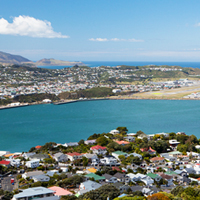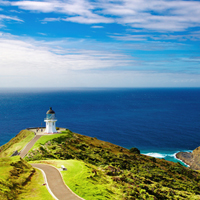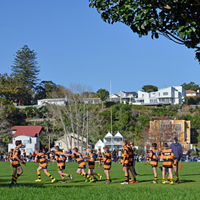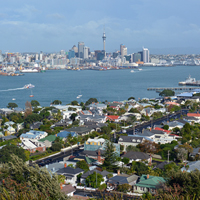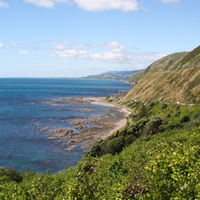New Zealand
Coastal BeachesNew Zealand is an island country located in the southwestern Pacific Ocean, consisting of two main landmasses—the North Island and the South Island—and around 600 smaller islands. It is known for its diverse and stunning landscapes, which range from rolling green hills and fertile farmland to rugged mountains and long, sandy beaches. The country's geography is notably varied, with active volcanic zones, such as the Taupo Volcanic Zone, and impressive geothermal areas like Rotorua, where geysers and hot springs are common sights. New Zealand's indigenous Māori culture is an integral part of the nation's identity, with its language, traditions, and arts celebrated throughout the country. The nation's cities, such as Auckland, Wellington, and Christchurch, are vibrant and multicultural, offering a mix of historical sites, cultural experiences, and modern amenities. New Zealand is also renowned for its commitment to environmental conservation, with numerous national parks, marine reserves, and initiatives aimed at preserving its unique biodiversity. The country's economy is developed and is based on various sectors, including agriculture, tourism, and manufacturing. New Zealand's political system is a parliamentary democracy, and it is a member of the Commonwealth of Nations. The country's remote location and stunning natural scenery have made it a popular location for film productions, including the famous "Lord of the Rings" and "The Hobbit" trilogies. With a population of approximately 5 million people, New Zealand is known for its friendly and welcoming inhabitants, often referred to as Kiwis, who enjoy a high quality of life and a balance between work and leisure.
 GeoBlue
GeoBlueGet Quote
GeoBlue is a trusted leader in international health insurance. Wherever your destination, GeoBlue can keep you and your family covered with the right health insurance. Get a GeoBlue Quote Today!
 GeoBlue
GeoBlueGeoBlue is a trusted leader in international health insurance. Wherever your destination, GeoBlue can keep you and your family covered with the right health insurance. Get a GeoBlue Quote Today!
Get Quote
Living in New Zealand
Best Places to Live in New Zealand
Visa & Residency
Obtaining a residency in New Zealand involves several steps and can vary in complexity depending on the type of visa. The Skilled Migrant Category Resident Visa is designed for individuals who have the skills to contribute to New Zealand's economic growth. To apply for this visa, candidates must first submit an Expression of Interest (EOI) detailing their qualifications, work experience, and ability to settle in New Zealand. If the EOI is successful and the candidate scores enough points, they may receive an invitation to apply for residency. Another pathway is the Work to Residence Visa, which allows individuals to work in New Zealand and after two years, apply for residency. This visa requires a job offer from an accredited employer or a role that is on a long-term skill shortage list. For digital nomads, the Working Holiday Visa is a popular option. This visa is available to young people, usually aged 18-30 (35 for some countries), and allows them to travel and work in New Zealand for up to 12 months, or 23 months for UK and Canadian citizens. The application process for this visa is relatively straightforward and can be done online. The process for obtaining a residency visa can be complex and often requires meeting strict criteria, including health and character checks, and providing evidence of professional qualifications and work experience. Some visas also require proof of English language proficiency. The processing time and difficulty can vary greatly depending on individual circumstances and the specific visa category. It is advisable for potential applicants to review the detailed requirements on the New Zealand website or consult with an immigration advisor to ensure they select the visa category that best suits their situation.
Healthcare in New Zealand
New Zealand's system is a mix of public and private services. The public healthcare system is funded through general taxation and provides free or low-cost access to essential medical services for all citizens and permanent residents. This includes hospital care, emergency services, and various types of outpatient care. The quality of public healthcare is generally high, with a well-organized system that prioritizes acute and emergency care. However, there can be waiting times for certain elective procedures and specialist services. Private healthcare is also available and offers faster access to treatment, with a range of private hospitals and clinics providing services for those who have private health insurance or are willing to pay out-of-pocket. The cost of private healthcare is higher than public, but it provides an alternative for those seeking immediate treatment or more choice in providers. Expats and digital nomads can access public healthcare if they have obtained a work visa that allows them to stay in New Zealand for two years or more. Those on shorter-term visas typically rely on private health insurance.
Cost of Living
The cost of living in New Zealand is considered high, with housing, particularly in major cities like Auckland and Wellington, being a significant expense for residents. Groceries and transportation can also be costly compared to other countries.
Weather
New Zealand experiences a temperate maritime climate, which means it has mild temperatures, moderate rainfall, and abundant sunshine. The weather can change unexpectedly, as the country is situated in a region where cold fronts and tropical cyclones can pass through. The North Island generally has warmer and more humid weather compared to the cooler and wetter South Island. Snow is common in the mountainous areas of the South Island during winter.
Educational System in New Zealand
New Zealand's education system is well-regarded internationally, offering a mix of public, private, and integrated schools. Education is compulsory for children aged 6 to 16, but most start at the age of 5. The system is divided into early childhood education (ECE), primary education, intermediate schooling (in some regions), and secondary education. Primary education starts at Year 1 and goes to Year 8 (ages 5 to 12), with intermediate schooling covering Years 7 and 8 (ages 11 to 12) either as part of the primary school or in separate intermediate schools. Secondary education spans from Year 9 to Year 13 (ages 13 to 17 or 18). Students in Years 11 to 13 take the National Certificate of Educational Achievement (NCEA), which is the main secondary school qualification. Schools focus on a broad curriculum and encourage extracurricular activities. The quality of education is consistently high, with a focus on preparing students for both higher education and vocational paths. The school year runs from late January or early February to mid-December, with four terms and holiday breaks in between.
Universities in New Zealand
New Zealand's university system comprises eight state-funded universities offering a wide range of undergraduate and postgraduate degrees. The academic year typically begins in late February or early March and ends in November, with a mid-year break. Undergraduate degrees usually take three years to complete, while an additional year is often required for honours. Postgraduate diplomas and master's degrees can take one to two years, and doctoral degrees usually require three to four years of full-time study. Universities in New Zealand are known for their research quality and student support services. International students are welcomed and supported through various programs. Admission requirements vary by university and program, but generally include a recognized secondary school qualification and proof of English language proficiency. Costs for international students are higher than for domestic students and can vary significantly between institutions and programs.
Copyright 1997-2025 Burlingame Interactive, Inc.

